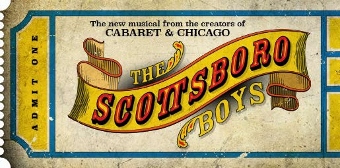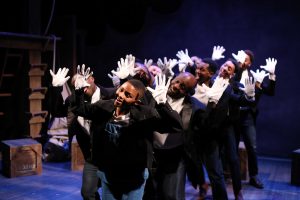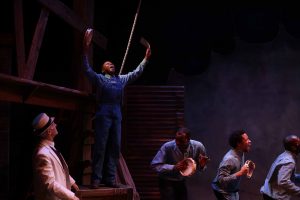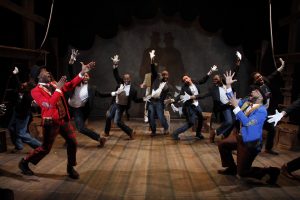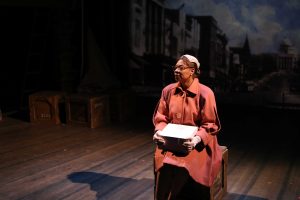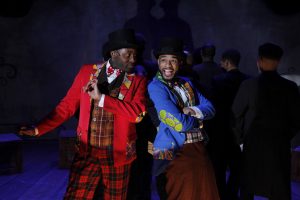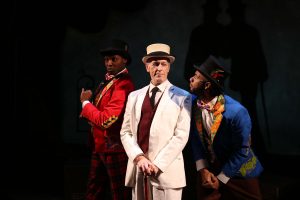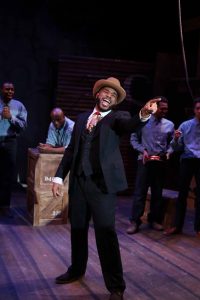THE SONGS AND THE FURY
Sardonic, ironic, cheeky, subversive’”hip epithets can’t convey the excruciating call-and-response fusion of humor and horror, laughter and tears, that you feel seeing The Scottsboro Boys. It was nervy enough in 2010 for Broadway legends John Kander and Fred Ebb and bookwriter Fred Thompson to create a musical about a travesty of justice. (That, of course, didn’t discourage Stephen Sondheim’s Sweeney Todd or the “lynching musical” Parade.) But these showmen dared to transform a Depression-era miscarriage of morality into a mock minstrel show. The Scottsboro Boys comes complete with “blackfaced” and white-gloved African-American performers luridly lit by downstage footlights, donning burlesque buffoonery, with a white Interlocutor to act as ringmaster, jerky “coon show” choreography, and a rampaging honky-tonk score to sell a sickening story.
No, this jubilee is not P.C. It’s more like a sugar-coated poison pill. The more you grasp the stylized fury behind this entertainment, the more you buy into its ultimate indictments. Maybe, just maybe, the musical’s refusal to marinate in righteous indignation is a deviously clever way to turn a discredited and now embarrassing American musical genre against its racist origins. And, by implication, accuse the (in)justice system that perpetrated the atrocity. Anyway that’s my critique and I’m sticking to it.
Historicized with period projections, Porchlight Music Theatre’s parody is a lot like George C. Wolfe’s equally undermining The Colored Museum and the musical Ragtime that employs its title syncopation to expose inequities in turn-of-the-century New York City. And it’s especially like Marat-Sade where, believing in enlightenment, the inmates of the Charenton insane asylum recreate the French Revolution. Here truly black performers turn on their honky “master,” art and history yoked in a corrosive bondage. (It’s no accident that, played by a white actor, the original “Jim Crow” began as a caricature in an 1820 music hall.)
No question, it’s downright dismaying to see and even relish the manufactured jollity and disciplined delight in this 105-minute jamboree. Quite simply, Porchlight’s uproarious and enchanting Chicago premiere of this Tony-nominated one-act is unimprovably played by a superb 16-member cast and six terrific musicians. It’s shaped to picture-perfect, emotion-accurate glory by stage director Samuel G. Robertson and raised to musical triumph by Doug Peck. But it never forgets the crime it chronicles.
The title victims, aged 13 to 19, were literally railroaded by bigoted Alabama cops; charged with the rapes of Ruby Bates and Victoria Price, industriously self-perjured white prostitutes; convicted and sentenced to death by all-white juries in eight trials from 1931 to 1937; ignored by the Supreme Court; and only reluctantly released when their innocence became incontestable. The nine Scottsboro “boys” paid a heavy price for being hobos. They sought jobs and adventure–and ended up spending almost half their lives behind bars. But, as one says for all, “I ain’t dyin’ for a lie!”
So it’s initially upsetting that, delivering the patented “razzle dazzle” they perfected in Cabaret, Chicago, and Kiss of the Spider Woman, Kander and Ebb regale us with “shuffling” spectacles like the opening “Minstrel March,” rousers like the company’s “Shout” and “Hey, Hey, Hey, Hey,” a sassy “Alabama Ladies” sung in drag by a cracked Southern belle, a fake ante-bellum salute in “Southern Days,” and twisted tributes to the “Electric Chair” and a stave-pounding “Chain Gang.” There are tears to be jerked in James Earl Jones II’s sweetly sad ballad “Nothin’” and the heart-breaking, homesick chorus “Go Back Home.” Richly melodic, enticingly rhapsodic, exuberantly danced (thanks to wizard choreographer Florence Walker-Harris), gorgeous in their harmonies and infectious in their rhythms, “Make Friends with the Truth” and “Never Too Late” are non-negotiably enthralling.
The only white performer, Chicago favorite Larry Yando delivers a smooth-faced, wickedly smiling “boss man” who, whether the Interlocutor, Memphis trial judge, or Governor of Alabama, slowly loses control of his propaganda vaudeville. The merry tyrant is assisted by minstrel-show regulars like percussive Mr. Bones (Denzel Tsopnang), tambourine-playing Mr. Tambo (Mark J.P. Hood) and The Lady (Cynthia Clarey), who at the end will become a famous freedom fighter. These stereotypes play, among others, the bone-headed sheriff, crusading defense lawyer Samuel Leibowitz, and assorted guards, lawyers and an attorney general.
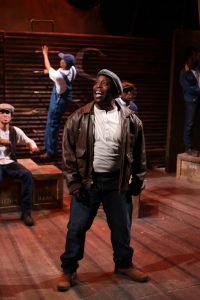 The rest, of course, are the Scottsboro boys-to-men. Memorably recreated by Travis Austin Wright, Maurice Randle, Cameron Goode, James Earl Jones II, Stephen Allen, Jr., Izaiah Harris, Trequon Tate, Jerome Riley, Jr., and Jos N. Banks, they’re both individually persuasive in their reactions to a massive frameup and devastatingly similar in their rage or resignation. No ensemble could enjoy more rapport.
The rest, of course, are the Scottsboro boys-to-men. Memorably recreated by Travis Austin Wright, Maurice Randle, Cameron Goode, James Earl Jones II, Stephen Allen, Jr., Izaiah Harris, Trequon Tate, Jerome Riley, Jr., and Jos N. Banks, they’re both individually persuasive in their reactions to a massive frameup and devastatingly similar in their rage or resignation. No ensemble could enjoy more rapport.
Detonating nightly at Stage 773, The Scottsboro Boys poses an agonizing “love-hate” dilemmas for a modern audience. It’s the most challenging kind of musical’”deliberate misdirection that adopts the supposedly carefree euphoria of a 19th century minstrel show to plumb the pain beneath the pageant. Of course, injustice is no cake walk’”but a guiltier pleasure cannot be imagined or a snazzier show highly recommended. Like the lost lads it chronicles, this crackling winner must be seen before being judged. Tough love deserves no less.
The Scottsboro Boys
Porchlight Music Theatre
Stage 773, 1225 W. Belmont Ave
Thurs at 7:30; Fri at 8; Sat at 4 & 8; Sun at 2
ends on March 12, 2017
for tickets, call 773.327.5252 or visit Porchlight
for more shows, visit Theatre in Chicago
